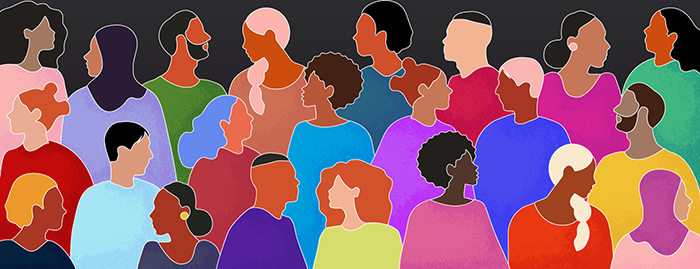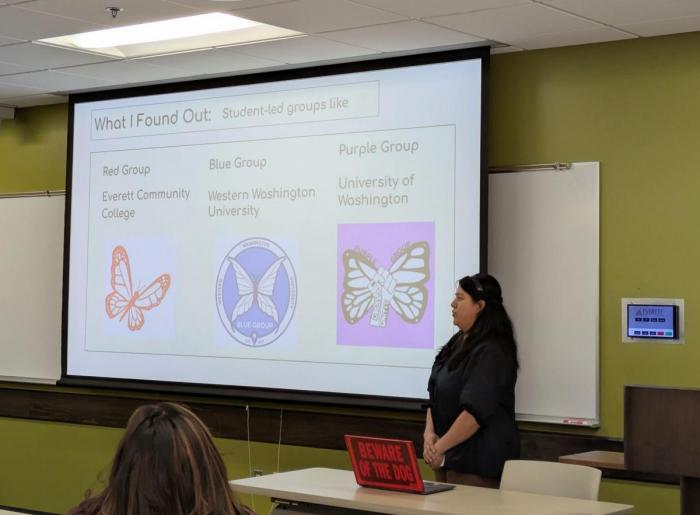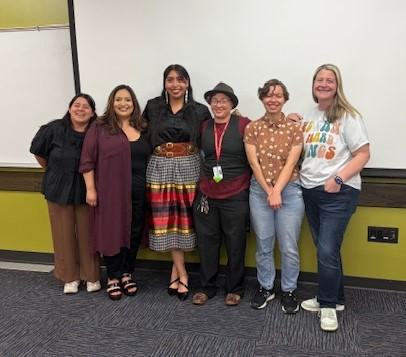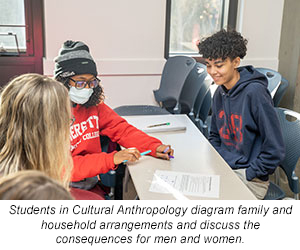Diversity, Equity, and Social Justice (DESJ)

If you’re inspired to work with diverse communities to promote equity and meaningful change, then EvCC’s Diversity, Equity and Social Justice (DESJ) academic track is where your journey begins. At Everett Community College, you’ll develop skills to critically analyze social structures where economic inequality, institutional racism, classism, and sexism impact human dignity. Then, through independent study opportunities, you’ll learn to apply your knowledge and understanding to spark change in real-world situations.
New: Earn a Degree Emphasis in DESJ
Starting in 2025-2026, you can complete the Associate in Arts and Sciences Direct Transfer Agreement Degree (AAS-DTA) with an Emphasis in Diversity, Equity, and Social Justice!
An emphasis is listed on your transcript as a way to showcase your knowledge and skills to transfer institutions, employers, or organizations offering opportunities like internships.
For current and prospective students, DESJ faculty are holding quarterly group advising sessions where you can meet other students with shared interests and learn about upcoming courses and how they meet DTA requirements for your AA.
Interested students should sign up here to be notified of DESJ news and events and consider registering for one of the classes listed below.
Enroll in DESJ Classes for Winter 2026!
Winter classes begin January 5. The following DESJ courses will be offered in the Winter 2026 term:
- SOC 170: Power and Privilege (HY)
- ART H 226: Art and Social Justice (OL)
- ENGL& 111: Introduction to Literature (HY)
- HUM 200: Introduction to Women, Gender, and Sexuality Studies (OL)
- ANTH& 206: Cultural Anthropology (HY & OL options)
- HIST 170: Multicultural American History (OL)
- POLS 210: Politics of Diversity (OL)
- DESJ 297: From Inquiry to Civic Action (HY, 2 credits)
Registration for all current students is now open. Take a look at the official class schedule for course descriptions and prerequisites.
New students: Apply now! Once you’ve received your ctcLink ID number, complete your enrollment steps. When you meet with an entry advisor, be sure to tell them you’re interested in DESJ so they can help you select classes.
News and Recent Events
2025 Student Capstone Presentations

DESJ 298 student Blanca Moreno presents her capstone work.
We are proud to announce that this year marks the third group of students to complete DESJ capstone projects! On June 11, EvCC students from DESJ 297/298 presented their work to a full audience of community members, students, staff, and faculty.

DESJ 298 students (left to right) Blanca Moreno, Reena Riojas, Princess Ascencio, Moss Martin, Nohri Nunez, and Jill Borchers
You can find more information about each student's project on their e-portfolio website:
Moss Martin - Basic Needs Insecurity
Nohri Nunez - Marysville Community Food Bank
Blanca Moreno - The Power of Community
Princess Ascencio - Silent Tragedies
Jill Borchers - Correctional Staff Wellness
Reena Riojas - From Intent to Impact
Program Requirements
For a complete overview of the courses you need to take in each phase of your degree, see the Program Map.
You can also keep track of your degree progress as a DESJ student by downloading and filling out the Program Checklist. ![]()
Along with fulfilling the general degree requirements, DESJ students will take:
- SOC 170D: Introduction to Power and Privilege
- Your choice of at least 4 DESJ electives from a list of courses in the humanities and social sciences that tackle a variety of topics from the perspective of equity and social justice.
- DESJ 297 and 298. Toward the end of your degree, you will enroll in a 2-course, 5-credit sequence that supports you in completing an original, community-engaged capstone project.
Career Opportunities
Whether you choose to enter the workforce with your associate degree, or transfer and complete your bachelor’s degree, you’ll find that DESJ positions at nonprofits, businesses, and government agencies are on the rise. Career opportunities are growing nationwide in response to public and corporate calls to improve diversity and inclusion in the workplace.
Undergraduate Majors
Completing the DTA with an interest in Diversity, Equity, and Social Justice can equip you to transfer to a four-year college or university to complete a Bachelor's degree in many different disciplines where the study of power and privilege is relevant. Some of those options include:
- Ethnic Studies
- Women, Gender, and Sexuality Studies
- Environmental Studies
- Sociology
- Anthropology
- Communication or Journalism
- Education
- Cultural Studies
- Urban Planning
- Public Health
- Public Administration
- Political Science
- Law
- Business
Learn more about the Association in Arts and Sciences Direct Transfer Agreement.
Student Experiences
Here's what students have to say about classes in the DESJ interest:
“My capstone project centered around the neurodivergent student body at Everett Community College. This was the most rigorous and fulfilling work I’ve ever done in my life, let alone my academic career. . . .Through this capstone project I’ve made connections within the EvCC institution (students, faculty, and staff) in a way that has encouraged me to believe that I can do more than I ever realized and feel more fulfilled than I thought was possible.” - Austin Au on the DESJ capstone project experience
“I am so proud of myself for choosing this class. I am most proud of the connections I have made along the way of this journey. . . .I have seen a group of people work together to complete a goal, I have seen the public come together to learn and advise each other and I have seen staff come together and guide the students to success.” - Alena Benoit on the DESJ capstone project experience
“Through my partnership with Washington Family Engagement, I am optimistic about the potential for our collaboration to extend beyond the confines of the academic setting. I sincerely hope that the research and work I have dedicated to this project will be used effectively to make a positive impact. . . .Reflecting on my work, I envision it as planting a seed that will germinate and flourish like an apple tree, providing nourishment and bearing fruit for the community.” - Justin Alvarado Flores on the DESJ capstone project experience
“The differences that we make in our younger years make up the people we are to become. This class has been very valuable in the building of my character and in my ability to help. I've also learned the value of doing something because it feels important. This project has also taught me a lot about responsibility and being able to see something to the end. It also feels good to do something because you can or have the ability to. It's nice being able to help people but sometimes you don't know where to help or how to help. . . .There are many communities that are in need of a bigger voice and this class allows you to be that voice.” - James Garret on the DESJ capstone project experience
“Throughout this project I pushed myself to step out of my comfort zone and to figure out the logistics of how and what I was actually executing to make things safer and achieve the change I desire from this project . . . many people came up to me after the presentations saying that they wouldn’t or haven't thought about the effects that safety and campus concerns [have on deaf and hard of hearing populations]. . .There was definitely a responsibility to do this project because if anyone can make a change for the better than why can't I do it?” - Megdalyn Loesch on the DESJ capstone project experience
“I am motivated to participate in connecting with my community and form relationships with others who share similar interests as me. This not only helped me grow as a person, but also allowed me to contribute to a larger cause and make a positive impact in my community.“ - Bhaby Jean Pascual on the DESJ capstone project experience
“I feel like I can see the world with a more equitable lens. Sociology taught me a lot I didn’t know about oppression, racism, sexism, etc., but doing this project I was able to change my whole opinion about the world around me. Ultimately, I have learned that we can and should question everything, especially if it appears as an injustice. Before, I wouldn’t have even tried to make waves about the Pride Center, but now, it all looks so different to me.” - Kirk Ralston on the DESJ capstone project experience
"The support to focus on something that I thought was important and also had an interest in helped me focus on a portion of the population that may need more resources for success in a society that is really good at overlooking the problems we have collectively." - Megan on the DESJ capstone project experience
“I really enjoyed going to the University of Washington and speaking with other volunteers to gain their perspectives. . .I learned a great deal about historic racism and the deeds as a tool of segregation, with the ripple effects through generations still impacting homeownership rates today.” - Dani on the DESJ capstone project experience
"I will be taking away knowledge that I can use to help people in my current life, future career, and for the rest of my life. Everything we have learned are things that I can pinpoint to a certain person that I know, and I will be able to relate to and talk to that person about these issues." - Isabelle on HUM 200D: Intro to Gender Studies
"My Introduction to Gender Studies class has taught me the importance of recognizing and challenging gender norms, understanding how systems and multiple identities intersect with an individual's experience, and recognizing power dynamics within relationships. I have a deeper understanding of how gender impacts individuals and society as a whole." - Megan on HUM 200D: Intro to Gender Studies
"DEI work is a passion of mine, and I have many opportunities to use the knowledge I’ve gained from this class to be a better participant in those spaces. . . .This course gave me a broader perspective of the way the race concept was crafted in America, and how it’s been used to disadvantage groups of people falling in non-white categories." - Alyssa on ANTH 122D: Human Diversity
"And that’s what I learned from this class. I learned that we have major power imbalances in our society. How that power imbalance affects the way we think and believe about each other. How that power imbalance affects the core structures and institutions of our society. And really how deep these biases are ingrained in our culture and our way of thinking. And it’s important for us to learn these things because once you can correctly identify a problem, you can start working on solutions." - Kaiden on SOC 170D: Power and Privilege
Get Started
If you’re already a student at EvCC, email desj@everettcc.edu to connect with a program advisor.
If you are new to EvCC, this checklist will help you to get started. When you meet with an entry advisor, mention you’re interested in the DESJ program.

